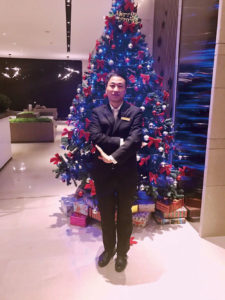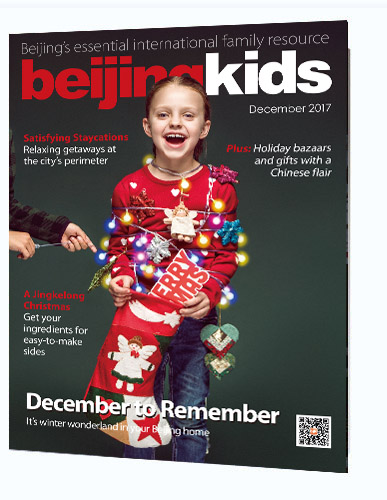On the surface, Christmas is everywhere in Beijing; from Christmas music at the mall, to Christmas decorations at the market. For most of the city’s foreigners, ‘tis the season to be jolly. We gather around mulled wine, dig out our big box of decorations from the attic, and put “White Christmas” on repeat from mid-November. But what does Christmas mean to the Chinese? If anything at all…
As I walk through the rotating doors of our compound on a grey, cold Wednesday afternoon, I feel my face expand in a big smile. The Christmas tree has arrived and the staff are climbing ladders and chatting about where exactly to place the big red bows. Or at least that’s what I pick up from my basic Mandarin. All I can think is, “Thank you.”
I catch receptionist Jim looking dreamy-eyed. Jim comes from Heilongjiang Province and moved to Beijing three years ago. Although he grew up in a Chinese Taoist family, his memories of Christmas are vivid. In the far and cold north of China, he could be seen at the tender age of 13 going into the forest on his own to find the perfect Christmas tree. He would, singlehandedly, cut it and bring it to his classroom for the school to enjoy. To say the very least, I am surprised how a tradition from my native Scandinavia traveled all the way to far eastern China.
“It was thanks to our middle school English books that I first learned about Christmas,” Jim says. “They would always have a chapter or two about Christmas, and I liked this foreign tradition. I would always daydream about experiencing a real Christmas. Yet the closest I ever got to a Christmas present was an apple wrapped in paper,” he laughs.
For the Bible Tells Me So
When the message “Yēsū ài nǐ” (Jesus loves you) ticked in on my phone one evening, I felt culturally confused for a moment. I quickly realized that it was not the WeChat translator playing a trick on me. The message was from my dear ayi Zhang Ting, who turned out to be part of the rather large Christian community in China. “It was my former boss from Hong Kong who first introduced me to the Lord,” she says. Now a devout Christian, she is actively involved in the local Church’s activities and attends Mass every Sunday.
“On Christmas Eve, my friends and I put on a song and dance performance at church and we then take to the streets of Beijing to hand out Christian leaflets,” she says.
Zhang Ting also does what she can to make her children experience the magic of Christmas. Having grown up in a Taoist family, she is their only Christian influence and does not get to see them very often, as they live in faraway Gansu Province together with her parents-in-law. When the children are in Beijing for Christmas, she brings them to church and showers them with love, food, and small Christmas gifts.

Jim, the receptionist
Travelling Traditions
I grew up in northern Denmark, and the influence from Asia was more or less limited to the town’s only Chinese restaurant. For all I knew, everyone in China ate chicken with cashew nuts and fried ice cream for dessert. As for Chinese traditions, I believe the first time I heard about Chinese New Year was when I went to university in the mid-nineties. But things were surprisingly different on the other side of the planet.
Just like Jim, Hua Lin first heard about Christmas when she was in middle school back in the eighties. “We only knew Chinese New Year so the chapter in our English book about Christmas and New Year in the West, took us by surprise,” she recalls. “The book had no pictures so we could only try to imagine what a Christmas tree looked like. Or Santa Claus for that matter.”
When Hua Lin was in her twenties, a big supermarket chain from Beijing opened a branch in her native Baoding. And the entrance of that supermarket was where she had her first-ever encounter with a Christmas tree. At that time, she did not know that she would one day move to Beijing, and that both she and her children (who attend an international school) would be able to observe how important Christmas is to China’s foreigners.
“In Beijing, we watch the foreign community gather around Christmas activities and come the 20th of December, we see them leave Beijing – loaded with gifts – to go back to their countries for the holidays.”
“When my husband and I enrolled our children into an international school, I wanted to give them some background knowledge about the foreign cultures they would be introduced to. I read Xifang Shénhuà Gù Shi – a book of western myths and stories – to them. I like the thought of keeping an open mind and embracing traditions we find lovely although they are outside our culture, so to speak.”

The front cover of the leaflet Zhang Ting’s church hands out to people
While the Christmas tales of Jim, Zhang Ting and Hua Lin are but a tiny sample of how the Chinese experience Christmas, they are testimonies of a China that has embraced the tradition of Christmas for much longer than I had imagined.
It may well be the commercial version of Christmas, since the Christian missionaries who came to China in the early 20th century were later sent away. But behind the blinking reindeer installation at the mall lies a cultural openness and an amount of knowledge about Christmas that surprised me. And what’s more, a study carried out by the China Social Survey Institute (CSSI) shows that Christmas is the second most-celebrated festival in China after the Spring Festival. But while in the west, Christmas tends to be all about family, the Chinese (or rather the younger generation between 14 and 45 years old) see Christmas Eve as an occasion to gather with friends, go out for dinner or have some fun at the local KTV place. While Christmas is not, nor will it ever be, a national holiday in China, it seems to be generating more and more interest. A lot has happened since Jim and Hua Lin first read that chapter about Christmas in their English books.
Did you know that…
– 圣诞快乐(Shèngdàn kuàile) means “Happy Christmas” in Chinese.
– The tradition behind giving each other apples on Christmas Eve comes from a play of words with the character 平 (píng). Christmas Eve is called 平安夜 (ping’an ye, “quiet/peaceful evening”), and this phrase uses the same píng in the Chinese word for “peace,”和平 (hépíng). The Chinese word for “apple” is 苹果 (píngguǒ), which has the same tone or pronunciation with the words above.
– Protestant Christianity is one of five approved religions in China alongside Buddhism, Taoism, Islam, and Catholicism (operating independently of Rome).
– If you hear 叮叮当当 (ding ding dāng dang) being played around Christmas in China, you guessed it right, it’s “Jingle Bells.”
– In China, Santa Claus is known as 圣诞老人 (Shèngdàn laoren), or “Old Christmas Man.”
Photos: Courtesy of Lise Floris and Zhang Ting
This article appeared on p52-53 of beijingkids December 2017 issue.





